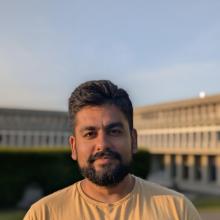Omran Safi
Why did you decide to pursue a graduate degree?
I have always been driven by curiosity and a desire to ask questions. Graduate school taught me how to approach these questions with rigour and discipline. I feel very fortunate to wake up every day and pursue my curiosities.
Why did you decide to study at UBC?
Completing my undergraduate degree at UBC allowed me to realize the breadth and depth of research being conducted here. I had so many interests and there was so much to learn from everyone! Ultimately, these interests led me to Dr. Palombo’s lab where it became apparent I would enjoy working and exploring my ideas. Being able to stay in my hometown was an added bonus!
What is it specifically, that your program offers, that attracted you?
The opportunity to work with my supervisor, Dr. Daniela Palombo, was a massive motivator. She is a world class researcher, an amazing mentor, and an even kinder person. Beyond this, I was also attracted by the breadth and depth of research being conducted in the Department of Psychology.
What was the best surprise about UBC or life in Vancouver?
As a Vancouverite, it's easy to overlook the beauty and uniqueness of this city. However, meeting people from around the world during my time at UBC has given me a renewed appreciation for all that Vancouver has to offer.
What aspect of your graduate program do you enjoy the most or are looking forward to with the greatest curiosity?
I love that I am surrounded by so many brilliant minds at different career stages. It is very refreshing to be able to share ideas, get feedback and have discussions with all of them.
What aspects of your life or career before now have best prepared you for your UBC graduate program?
During my undergraduate studies, I had the opportunity to work as a research assistant, an experience that equipped me with valuable skills and insights that were highly beneficial in graduate school.
What do you like to do for fun or relaxation?
I like to play basketball, ride my bike, kayak and go hiking. If I am not reading, I am likely outside moving my body.
What advice do you have for new graduate students?
Often, it is easy to feel overwhelmed and shy away from discussing your ideas and asking questions. You will have lots of ideas and lots of them will be bad... and that's okay. Keep asking questions and keep learning! Use your graduate studies to learn from those around you, get feedback on your ideas and make yourself a well-rounded researcher.
Learn more about Omran's research
Our episodic memories — memories for events from a particular place and time — allow us to recall specific events from our past, including where we were and what we were doing. Time is the thread which binds the disparate episodes of our experience into a coherent story, providing continuity and consistency as we traverse our lives. My research focuses on examining the interplay of "what" and "when" in memory to determine how the contents of our memory influences recalled duration. What are the different factors affecting retrospective duration? How does the brain treat different types of information (e.g. emotion, event-boundaries, quantity, etc.) when making retrospective duration judgements? To answer these questions, my work utilizes a combination of traditional lab studies, virtual reality, and qualitative and quantitative analyses. While both space and time are fundamental elements of episodic memory, our perception of them is far from equal.
Time has traditionally been viewed as a singular phenomenon, much like space. However, such a notion of time is rooted more in the framework of physics than one of cognitive science. Our experience of time is fluid and dynamic — bending, stretching, distorting and even breaking in ways that aren’t as immediately evident with space. This suggests that the subjective experience of time cannot be simply equated with the experience of space. To fully understand how we perceive time, we must move beyond a monolithic view of subjective time and adopt a more nuanced approach, one that acknowledges that time in the brain is not a singular, uniform phenomenon. Rather than "time,” there are "times" — multiple, distinct ways in which time is experienced and remembered. My research contributes to advancing this view by examining which factors affect recalled time and how.
